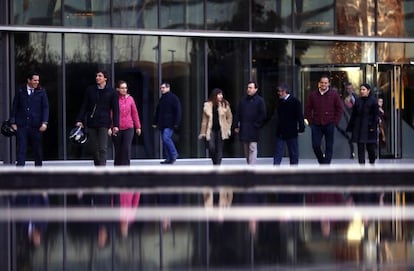Why is nobody changing Spain’s long working hours?
Most people agree it would be better for health and productivity, so what’s the holdup?

At around 3.30pm, they order the first bottle of white wine. The five men wearing suits seated round the table pour themselves a glass and make a toast. It’s Wednesday, and a lengthy lunch has just kicked off in a well-known Madrid restaurant popular with the capital’s business community. It will be a relaxed affair, lasting more than two hours, and accompanied by ham and prawns, and all washed down with plenty of wine. The group will then return to their respective offices, where their subordinates will be waiting to begin the second part of their long working day. They and their bosses will not be getting home until at least 8.30 or even 9pm, just in time for dinner.
Many people equate long hours to dedication, but much of that time is not spent productively
Welcome to Spain, where the European habit of working from nine to five has never taken root, and where long hours and low productivity are the norm, a hangover from the days following the civil war when people worked two or more jobs. It’s a habit that ignores the reality of a world where technology allows more and more of us to work from home, and in which men and women increasingly share parenting and other domestic duties. Just about everybody in Spain says they want to see the working day reduced, and that this country’s working practices are not good for health or productivity. So what’s holding up the change?
Part of the problem lies with a generation of business leaders who have grown up with outdated working practices. At the same time, successive governments have failed to address the question. An attempt during the current legislature to change working hours ran aground.
Also to blame is General Francisco Franco, who in the early years of World War II, when it looked like Germany was going to win, decided to put Spain on Berlin time, taking it an hour forward from GMT, where it had been until then and where, because of its geographical location, it should logically be. The hard years that followed the end of conflict in Europe meant that many Spaniards worked two jobs: one in the morning, and another in the afternoon or early evening.
More hours at work, less productivity
Recent data from the OECD demonstrates that Spaniards work more hours than their neighbors in northern Europe, but are less productive.
Eurostat figures show that Spanish productivity in 2013 was equal to €32.1 per hour worked, compared to €45.5 in Sweden and €42.8 in Germany. In other words, Spaniards spend more time at work, but get less done.
Studies show that people who work shorter, more intensive hours focus more on their work, leaving them time to be with their families, which in turn reduces stress and absenteeism. Spain’s Center for Sociological Studies reported in March 2014 that 45 percent of people said they found it hard to address family issues given the amount of time they spend at work. Just over 36 percent said they had less than three hours free each day.
According to the Organisation for Economic Co-operation and Development (OECD), Spanish working practices still leave much to be desired, with many people equating long hours to dedication, when the reality is that much of that time is not spent productively.
There have been attempts to deal with the problem. In 2012, a parliamentary subcommittee was created that talked to academics, business chiefs, labor leaders and other interested parties. In the fall of 2013, it released a report calling for “legislation that would lead us toward working hours more in common with the countries of the EU.” It also highlighted that such an approach would “increase productivity and reduce absenteeism.”
The report also suggested incentives for companies that took the lead in reducing working hours and increasing productivity. It also called on television stations to bring forward their prime-time programming from 10pm to 9pm, for Spain to move back to GMT, and to push for the working day to end at 6pm at the latest. Inspectors would be required to enforce the measures, and companies would be invited to introduce more flexible working hours.
The government was supposed to present the recommendations to Congress, but has so far failed to do so, and it’s clear that the administration, like so many others before it, has other priorities, as the ruling Popular Party’s Carmen Quintanilla, president of the subcommittee, points out: “Any change to working hours would have to be carried out through an economic study to see if it was worth it. This study has not been commissioned. The prime minister is very concerned about this question, but with the crisis he has had to take other, more urgent measures. This has been a very difficult legislature, and we didn’t want to open any new debates. We hope to be able to do so in the next.”
Lourdes Ciuro represented Catalan nationalist party CiU on the subcommittee, and argues that a public debate is needed. “Whoever is in power has a responsibility, but nobody is prepared to get their hands dirty,” she says. “Regeneration and transparency are also part of this: we must make sure that the subcommittee’s work isn’t just forgotten. There is a lot of hiding behind the crisis, but we weren’t making much progress before either.” Ciuro says that one way to start would be to award government contracts, at national, regional and local level, to companies with European working hours.
But the subcommittee failed to agree on the impact of recent labor reform legislation. The Socialist Party described the measures as “a head-on attack on conciliation, because it gives freedom to the business owner to organize working hours.” The previous Socialist Party administration of José Luis Rodríguez Zapatero took a hands-off approach, allowing businesses to decide for themselves. But as equality spokeswoman Carmen Montón points out: “Without legislation, nothing will change.”
Eurofound, the EU agency tasked with improving living and working conditions, says that in Spain, unlike in other European countries, in 73 percent of cases, employers set working hours, and 75.5 percent of employees say they are unable to accumulate working hours to get free time.
“People want change, but politicians are afraid, because they don’t know how any proposals will be received,” says Nuria Chinchilla of the IESE business school. “We need a leader who will give the go ahead, with every sector doing so at the same time.”
Catalonia leads the way
Meanwhile, in Catalonia, the debate about the need to change working hours is more advanced. The regional parliament has reached consensus on outlining a draft law on working hours that will go ahead following the September elections there. At the same time, the regional government has said it will push for labor unions and business to work together on the issue. “What we are looking for is a cultural change, so that we can eat at one and dine at eight,” says Agnès Russiñol, head of a regional parliamentary committee looking at the issue. “The idea is to bring everything forward.”
The committee’s conclusions include proposals aimed at local government, the civil service, education, business and the arts and entertainment industries. Many of the ideas are similar to those mooted by the Congressional subcommittee. They call for collective bargaining agreements to include specific measures to reduce working hours based on performance, rather than time spent in the workplace, as well as the creation of an office to help companies reorganize their working hours. Again, the idea would be to bring television programming forward, with the main evening news going out at 8pm.
We are a strange country: we find it easy to get used to doing things the wrong way” José Luis Casero, working hours campaigner
Fabián Mohedano, the man behind a popular campaign to reform working hours in Catalonia, says he hopes to see major change within three years, comparing the process to the one that introduced legislation to ban smoking in public places, which was brought in gradually. “Not long ago, it seemed impossible that you would be able to leave a night club not smelling of smoke. Not now. By banning smoking in public places, we’ve managed to get people to smoke less at home.”
He accepts that it may take time before Spaniards eat at 1pm, but says cultural habits change with the law. He also argues that, like smoking, this is a health issue. The facts that people in Spain sleep fewer hours than in other countries, take more medication, and have one of the lowest birth rates in the OECD are all to do with working hours, he argues.
“The only time we are Europeans is when the Champions League is on,” says José Luis Casero, who is campaigning for a change in working hours at the national level. “Our politicians need to take some brave decisions and to start by returning to GMT. One of the consequences of the hours we keep is that both children and adults sleep less and are less productive during the day. We are a strange country: we find it easy to get used to doing things the wrong way.”
Meanwhile, at that Madrid restaurant, it is 4.20pm. The businessmen get out their files and start to talk seriously about work. Just before 5pm, they pay the check and leave. They slap each other on the back and shake hands, ready to return to work, where they will remain until dinnertime.
Tu suscripción se está usando en otro dispositivo
¿Quieres añadir otro usuario a tu suscripción?
Si continúas leyendo en este dispositivo, no se podrá leer en el otro.
FlechaTu suscripción se está usando en otro dispositivo y solo puedes acceder a EL PAÍS desde un dispositivo a la vez.
Si quieres compartir tu cuenta, cambia tu suscripción a la modalidad Premium, así podrás añadir otro usuario. Cada uno accederá con su propia cuenta de email, lo que os permitirá personalizar vuestra experiencia en EL PAÍS.
¿Tienes una suscripción de empresa? Accede aquí para contratar más cuentas.
En el caso de no saber quién está usando tu cuenta, te recomendamos cambiar tu contraseña aquí.
Si decides continuar compartiendo tu cuenta, este mensaje se mostrará en tu dispositivo y en el de la otra persona que está usando tu cuenta de forma indefinida, afectando a tu experiencia de lectura. Puedes consultar aquí los términos y condiciones de la suscripción digital.









































